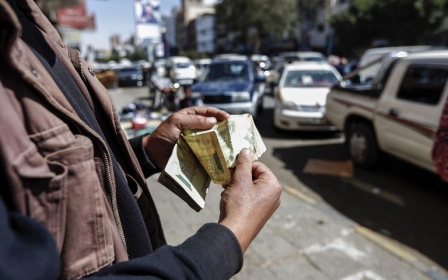Yemen rebel chief urges 'resistance' after peace talks collapse

The head of Yemen's Houthi rebels called on Saturday for "resistance" as UN-brokered peace talks with the government collapsed after the rebels stayed away.
"Our choice is steadfastness and resistance to aggression on all fronts," rebel chief Abdulmalik al-Houthi said in a defiant speech.
"I appeal to the free and honourable people of Yemen today to go to the fronts ... We must move on all fronts to recruit for our defence," he said in a speech broadcast on rebel TV.
Houthi representatives failed to show up at the talks in Geneva earlier in the week, prompting UN envoy Martin Griffiths to call off the attempted negotiations on Saturday.
The peace talks, initially scheduled to open on Thursday, would have been the first official negotiation effort between the government and rebels since 2014.
The Iran-allied Houthis refused to take off from the rebel-held capital for Geneva unless the UN met a list of conditions, which included securing a safe return to Sanaa for their delegation.
They accused the Saudi-led coalition backing Yemen's government of planning to strand their delegation in Djibouti, where their plane was to make a stop en route to Geneva.
While the rebels control Sanaa, the coalition controls Yemen's airspace.
The Houthis hinted they feared a repeat of 2016, when 108 days of talks in Kuwait broke down and a rebel delegation was stranded in Oman for three months amid an air blockade.
The UN special envoy said the failure of the talks did not represent a "fundamental blockage in the process" and that he would meet soon with Houthi representatives in Sanaa and in Muscat, Oman.
"They would have liked to get here, we didn't make conditions sufficiently correct to get them here," Martin Griffiths told a news conference on Saturday in Geneva, declining to elaborate.
An agreement had been reached for medical evacuations from Sanaa, to start in a week with a flight to Cairo, he added.
Yemen's foreign minister accused the Houthis of "trying to sabotage the negotiations," and said that Griffiths had not been firm enough with them.
"We want the UN to be firmer in bringing the other party to the negotiations," Khaled al-Yamani told a news conference before leaving Geneva after three days of talks with Griffiths on confidence-building measures, including prisoner releases.
Yemenis react
Speaking to Middle East Eye, ordinary Yemenis said they were generally unsurprised at the failure of the talks, as little had changed compared with the circumstances of three previous rounds of failed discussions.
"The warring sides did not show any desire for a peaceful solution before 6 September," the day the talks had been due to start, Mohammed al-Shadadi, a car engineer in Taiz city, told MEE.
"The UN envoy wants the warring sides to agree a peaceful solution while they are escalating in military operations on ground," he added. "The UN envoy should have imposed a ceasefire before the talks and if this ceasefire had been successful, that would have meant the warring sides may agree over other issues.
"Yemenis want a peaceful solution and we believe that a peaceful solution comes through talks, but ... there are some beneficiaries of this war and they lead the war in Yemen, so in this way it is difficult to them to welcome a peaceful solution."
Jalal al-Odaini, also a resident in Taiz city, concurred: "There was nothing new in these talks, so it is normal for them to be a failure. The only difference is that this time the talks failed before they began."
Odaini, who works as a bus driver, said he believed that because the leaders of either side of the conflict live abroad or in safe areas in Yemen, they will continue to threaten each other without feeling the suffering of Yemenis in conflict zones.
"We have not heard the language of reconciliation and tolerance from the leaders of the war recently," he told MEE. "Instead, we have been hearing the language of violence and an exchange of accusations.
"If the UN wants the peace talks to succeed, they have to make the talks' participants live in a conflict zone for one month.
"They should feel our suffering to solve it, otherwise any talks will be meaningless."
Abd al-Rahman Zakaria, a supporter of Saudi-backed Yemen President Abd Rabbu Mansour Hadi, works as a teacher in Taiz.
"The Houthis do not believe in peaceful solutions, and during their history they have not once believed in a peaceful solution," he said. "The Saudi-led coalition should support the forces on the ground to liberate the country from the hands of Iran in Yemen. This is the best solution."
Meanwhile, a Houthi supporter in Sanaa told MEE: "The national delegation [of the Houthis] agreed with the UN envoy during his visit to Sanaa to take some injured people with them to Oman, but then the Saudis imposed their conditions and the UN did allow the Omani plane to take the delegation with the wounded.
"The Saudis want Ansarullah [the Houthis] to follow their commands while the UN envoy cannot do anything. The Saudis do not want a peaceful solution."
An MEE contributor reported from Yemen for this story.
Middle East Eye propose une couverture et une analyse indépendantes et incomparables du Moyen-Orient, de l’Afrique du Nord et d’autres régions du monde. Pour en savoir plus sur la reprise de ce contenu et les frais qui s’appliquent, veuillez remplir ce formulaire [en anglais]. Pour en savoir plus sur MEE, cliquez ici [en anglais].




